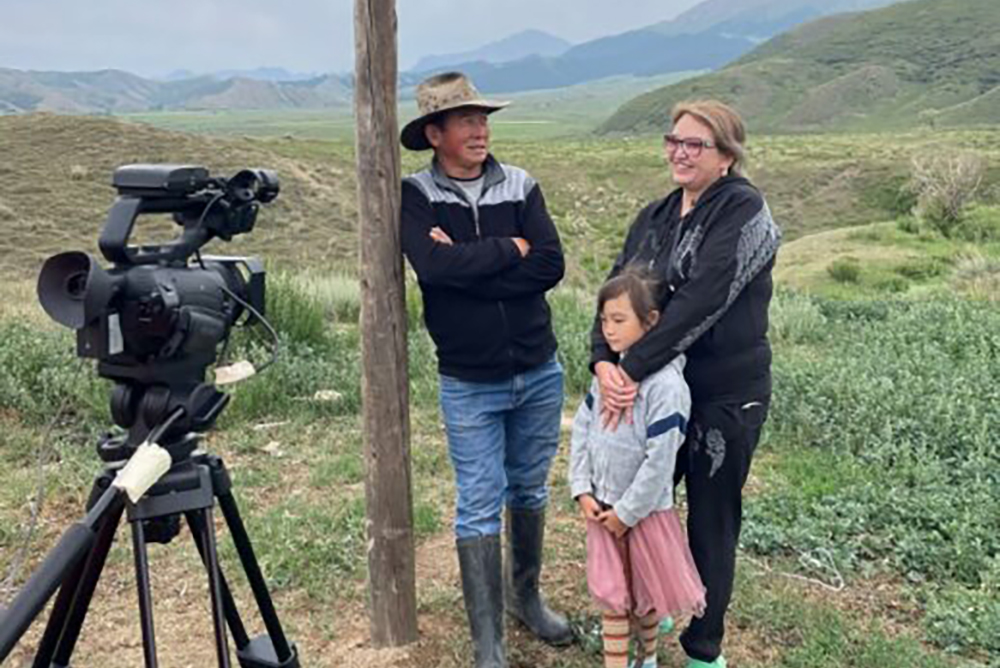Research Project Models Collaboration for Rural Sustainability Across Institutions, Disciplines, Countries
Student researchers interview a rural community member in South Africa. Photo courtesy of CORUSUS.
A Rich Teaching Exchange Benefits Students and Faculty
For the second year, CORUSUS offered its accredited course on “Ethnoecology'' in Vienna to 20 students from CEU, AUCA, and AUB, hailing from 16 different national backgrounds. The three partner institutions co-developed the course curriculum and encouraged a rich interactive exchange between faculty and students. Partners also offered the “Survey Research Methods'' course at WITS, bringing together a diverse group of 10 South African students with mixed experiences regarding survey research methodology in rural settings.
Students reacted favorably to the Ethnoecology course, saying that the input of faculty and speakers from universities in different countries allowed them to learn more about rural sustainability challenges particular to each place. They also rated highly the lectures and readings for the Survey Research Methods course.
Surveying Rural Households Across Three Countries

Project researchers conduct a video interview in rural Kyrgyzstan. Photo courtesy of CORUSUS.
Preliminary data results indicated that livestock farmers in various locations face unique challenges but also employ a variety of adaptation strategies to overcome these challenges. Both livestock owning and non-livestock owning farmers were largely optimistic about the future, recognizing the rich socio-cultural, environmental, and economic value of livestock to their communities and lands. Additional livelihood threats faced by rural households include rural out-migration of the young, extreme climate variability, human-wildlife conflict, and market pressures.
Video interviews with farmers also found a growing concern about the future of livestock farming. Stock theft, livestock health, and livestock maintenance were all growing challenges, made worse by bleak job opportunities and climate change impacts. The issue of food shortages resulting from poor land use management and extreme weather conditions was also raised.
A Cross Fertilization of Beneficial Ideas
The CORUSUS team has found that data gleaned from research in each location (South Africa, Kyrgyzstan, and Lebanon) yields learnings that can benefit each partner across the Global South. The research “provide(s) valuable information on the impacts of climate change on small-scale livestock farmers” and how farmers are adapting in different contexts, says Wayne Twine, project co-leader and Professor of Ecology at the University of the Witwatersrand. For example, a field visit to rural South Africa alerted colleagues working in rural Lebanon and Kyrgyzstan to a different set of development approaches that were helpful in each respective context.
The project also embraces a symbiotic multidisciplinary approach, bringing together experts from a range of fields, including agriculture, ecology, environmental science, economics, and social science. Natural scientists offer insights into environmental dynamics, resource management, and technological innovations, while social scientists contribute knowledge about human interactions, cultural norms, and decision-making processes.
“Collaboration across disciplines and borders encourages the cross-fertilization of ideas. This often leads to the creation of innovative solutions that might not have been conceived of within a narrower scope,” says Ruslan Rakhimov, project co-leader and Associate Professor of Anthropology, Technology, and International Development at AUCA. Some of the solutions arrived at in this multifarious manner include supplementary feeding, the use of traditional wild plants for livestock feed in times of drought, and the modification of timing and areas for grazing.
The multinational and multidisciplinary knowledge networks that comprise CORUSUS are proving to be key assets for partners as they seek to ensure sustainability beyond the duration of the project. Delving into previously unconsidered research opportunities, engaging with new partners, and sharing innovative knowledge and insights are all ways that partners can upscale project impacts so they benefit their own particular set of circumstances. The insights gained contribute to a rich base for potential future collaboration on many themes that address rural sustainability and its environmental, social, and economic aspects.
Post Date: 12-12-2023